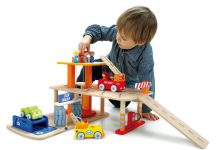With the current economic crisis and the spread of H1N1 flu, people in general are experiencing loss and stress in various ways. What makes us resilient and how can we raise a child who can withstand whahatever life throws at him?
No two people react the same way to a difficulty some have the amazing ability to spring back and are positive. Others may struggle for much longer. Clearly, none of us are immune to bad things – like death and taxes, they will happen even to the luckiest among us. The interesting thing is how we deal with it and how we raise our kids to do the same. The definition of resiliency is the natural ability to cope with an adverse situation – a quality conveyed through feelings and thoughts that help overcome a difficult situation. Resilience in short can be referred to as ‘emotional strength’.
As parents and teachers, our first instinct is to protect our children from any difficult situation. The natural impulse is to protect them and solve their problems. But this is only as good as when they are under your care – when they outgrow their parents and become adults, they will find themselves at sea – unable to deal tough things on their own. A smarter way perhaps is to enable our children to weather crisis.
Qualities Of Resilient Kids
Research from various fields like psychology, psychiatry, and sociology shows that most people including children and young adults can bounce back from risks, stress, crises, and trauma and move on to success. But those who did so had some of these in common:
Has A Role-Model Or Mentor
The presence of a supportive person like a teacher, grandparent or friend’s parent helps tremendously.
Thinks Of Others
Considerate children who helped others managed to deal with stress better.
Is Independent
Kids who were independent and accepted responsibility for the things that went wrong fared better.
Is Gainfully Engaged
Those who had an active outside-school life filled with hobbies or sports had an outlet to deal during tough times.
Has Self-Belief
Those who believed that one has influence over their life did better. Parents who provided concrete examples that demonstrate how their efforts lead to their accomplishments help build this internal strength.
RESILENCE BUILDING
Psychologist Siobhan Coulter says everyone has the innate capacity to be resilient but how good we are at it can be influenced by external factors, such as parenting styles, relationships with other adults and life events. She suggests six areas which research has suggested parents can focus on:
Promoting Positive Self-Esteem
Kids who are confident of themselves tend to do better. But instead of always saying “you were great”; explain why with examples to show you mean it. And remember not to single out academic achievements.
Supportive Adults
This includes extended family members, teachers, parents of friends and other people of influence in your child’s life. Caring and concerned adults provide a loving environment and promoting resilience. She’ll learn that she can seek help from people besides
her parents.
Stopping A Negative Chain Of Events
Bad things do happen to our children and sometimes we cannot prevent that. However, if you can stop that event from spiralling out of control you can help your child managing it better.
Positive Life Opportunities
When your child experiences a pattern of positive events, she learns to trust outcomes and hope that her efforts will pay. She’ll believe she can influence her life. This is positively related to resilience.
Reduce Risks
This can be done in two ways: by limiting your child’s exposure to the risk or by changing the situation to reduce risk. For example, limit your child’s playtime with friends who have anti-social skills or aggressive behaviours. Limit television programmes that you deem unsuitable.
Positive Cognitive Processing
Reframe adverse or negative life events to focus on the positive aspects. Teach your kids to find the silver lining to every event. It is also important not to deny the negative aspects of the event; but don’t dwell on it either.
WHAT YOU CAN DO
Here Are A Few Ideas:
Happy parents generally raise happy children. So, first make sure that you are content and generally pleased with life. Your happiness can be infectious.
Teach the child to communicate effectively and talk to him about ‘courage’ and ‘determination’. Examples like the ‘Little Engine That Could’ go down well with children. At times when they say ‘I cannot’, you could encourage them and chant with them like the Engine did- ‘I think I can, I think I can’.
Encourage her to use words to describe her feelings. “I’m angry with you because”, “I’m so excited to” , “ I wish we could” etc
Play with your child and pray with your child and express gratitude. Grateful kids are more positive and happier. They learn to appreciate what they have rather than what they don’t.
Tutor your child from an early age to take responsibility. When your child blames someone or something for a poor result, tell him that nobody or nothing in this world has the ability to make him perform badly or feel poorly.
Provide role-models to your child. Expose them to people who have overcome difficulties in life. If there are such people within your family then do ensure that the kids spend time with them. Also, include small anecdotes of how you/spouse fought against hard times and came out of it successfully.
Positive approach to everything will teach your child that there is some good even in a disastrous situation. Deliberately make a positive comment even when things are not turning out to be great. If your child flunks an exam, make him identify at least one positive lesson (e.g., “I now understand my weak point and I will focus on that in the next exam”) that he has learned from the experience.
Encourage the child to make decisions and resolve issues. In the process if he makes mistakes, let him. Teach him that mistakes are an essential part of learning.
Trust the child and make sure that he knows that you value him. Consciously show the child that you believe him.
Promote flexibility. Make sure your child tries different foods, hobbies, books etc. Teach them that if they can’t get something that there are always other choices.
ONE MOTHER’S EXPERIENCE
Mrs. K. Kanthimathi’s son Vishal just went through a rough patch recently. Vishal was diagnosed with an ailment that required a series of intricate surgeries. His regular routine went through major changes. Now nearly at the end of his medical treatment, Vishal has emerged stronger, cheerful and definitely more resilient – a classic example of a child who has displayed resiliency at its best and a family that was extremely supportive.
He sets challenges for himself and is very thrilled when he achieves them. Even during his ailment and recovery period, he would always say to himself: “I will get better soon”
When we first found out about the condition, we were shocked and sad. But we decided from the beginning that we would not hide anything from him. We explained every single detail, even the hard parts, where he had to be immobile for several months and may not get totally cured. He took it in a very mature manner. All of us read up about his condition, including him. It was the best way for us to deal with it initially.
We made sure that all of us were there to hold his hand, talk to him and guide him. But I think his perseverance and time management skills helped him greatly. He sets challenges for himself and is very thrilled when he achieves them. Even during his ailment and recovery period, he would always say to himself: “I will get better soon”. My husband and I are always giving him assurance and make him feel that any difficulty is only a passing cloud.
There were very low moments of course. Vishal was very sad about not being able to play for months. In the initial stages, he was not even allowed to move from the bedroom to the living room. But his low feelings lasted for a very short while. He quickly took to his hobbies and developed new ones like reading about current affairs. He focused his attention on these interests and read voraciously.
He would hear me sing and soon, picked up singing too; it was wonderful to bond with him that way. Sometimes he would sit by the window looking longingly at the other kids. Soon, I realized that he was observing the birds singing, the flowers blooming and showing a keen interest in nature.
Vishal kept himself busy throughout his ailment. His ‘never say die’ spirit and his positive nature along with the support of his family have helped him tide through this rough patch. Vishal has resumed school and now enjoys his football sessions in the playground. I am so thankful for that.






































